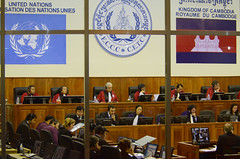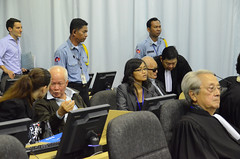
This week, the Trial Chamber of the Extraordinary Chambers in the Courts of Cambodia (ECCC), commonly referred to as the “Khmer Rouge tribunal” began hearing opening statements by the prosecution in Case 002, in which Nuon Chea, Ieng Sary, Ieng Thirith and Khieu Samphan are accused of crimes against humanity, grave breaches of the Geneva Conventions, and genocide in connection with their leadership positions in Cambodian government in the late 1970s. The four aging former Khmer Rouge leaders were placed in preventive detention in 2007 and indicted in 2010 for alleged responsibility in the atrocities committed under the Khmer Rouge from 1975 to 1979. During that period, an estimated 1.7 million people were killed and the population was subjected to forced labor, starvation, and ideological, religious and ethnic persecution (timeline here). Although the ECCC found Ieng Thirith unfit to stand trial and stayed the proceedings against her earlier this month, the prosecution has appealed the decision to release her.
The Case 002 indictment (“closing order”) refers to specific instances of: mass displacement; forced labor; detention and execution sites (e.g., S-21 security center, the Au Kanseng security center); crimes against the Cham, Vietnamese and Buddhist populations; and regulation of marriage (forced marriages).

As is permitted in a number of countries, the ECCC is the first internationalized criminal tribunal to allow civil parties to participate directly in the criminal proceedings. For analysis, see Alain Werner and Daniella Rudy, Civil Party Representation at the ECCC: Sounding the Retreat in International Criminal Law?, 8 Nw J. Int'l Hum. Rts. L. 302 (2010).
Previously, defendant Kaing Guek Eav (“Dutch”) was convicted of crimes against humanity and grave breaches of the Geneva Conventions, and sentenced to a reduced 30 years’ imprisonment. Both parties have appealed the judgment and civil parties have appealed the order on reparations and the admissibility of civil party applicants. [ECCC]
The New York Times provides a succint recap of ECCC proceedings to date:
In 2003, after nearly a decade of wrangling between the United Nations and the government of Cambodia, a U.N.-backed war crimes tribunal was established, and in 2006, more than 27 years after the mass killings, formal proceedings began against surviving leaders of the brutal regime.
On Feb. 17, 2009, the first trial of a senior Khmer Rouge cadre opened. The first defendant was Kaing Guek Eav, 66, better known as Duch, the commandant of the Tuol Sleng prison and torture house, which sent at least 14,000 people to their deaths in a killing field. He was sentenced to 19 years in prison.
On June 27, 2011, in the second phase of the proceedings, four surviving leaders of the Khmer Rouge went on trial. The defendants, now old and frail, are Khieu Samphan, 79, the nominal head of state; Nuon Chea, 84, described as the Khmer Rouge’s ideologue; Ieng Sary, 85, the foreign minister; and his wife, Ieng Thirith, 79, who was minister of social affairs. They were charged with genocide, war crimes, crimes against humanity and murder. All the defendants declared their innocence.
In mid-November Ms. Thirith was excused from the case when judges in the tribunal ruled that she had dementia and was not fit to stand trial.
On Nov. 21, testimony in the case began. Opening statements started with a horrifying and detailed account of the atrocities of a regime that a prosecutor said was responsible for the deaths of one-fourth of the population.
Though the wide-ranging accusations were familiar, their presentation in a coherent narrative, studded with specific examples, was powerful and caused some elderly Cambodians to shed tears. The three defendants listened as one of the prosecutors accused them of turning the country into “a massive slave camp producing an entire nation of prisoners living under a system of brutality that defies belief.”
This complex trial involving tens of thousands of documents and a roster of aging witnesses was the centerpiece of the prosecution of leading figures in the Khmer Rouge.
As one of the most digitally transparent international tribunals, the ECCC makes available: photographs and videos of court appearances and hearings, filings and applications submitted by the prosecution and defense, a detailed schedule of trial proceedings, and info sheets on the prosecutions and defendants.
Opening statements in Case 002 will continue this week, with hearing of evidence scheduled for November 28. In recent weeks especially, the ECCC has been criticized as subject to undue UN and government influence.
